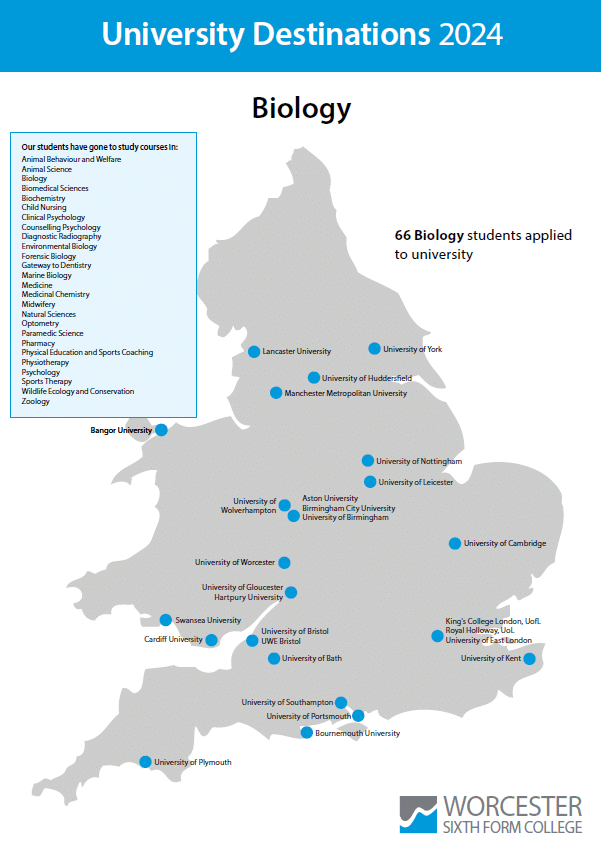Why Study Biology?
Biology is a wide-ranging subject with which you will gain valuable transferable skills as well as a holistic understanding of life processes. Biology A Level reflects this with a diverse range of topics:
- the microscopic with topics like: Biological compounds, Cell structure and Microbiology
- physiology of the whole organism including: Adaptations for Gas Exchange, Nutrition and Nervous system
- human biology and comparative anatomy, such as: Homeostasis and the Kidney, Human reproduction and Musculoskeletal system
- global biology and ecosystems with topics like: Human impact, Populations and Biodiversity
- genetics including: Nucleic acids, Inheritance, and Gene technologies
Your practical endorsement will support and enrich your understanding of biological phenomena where you will complete a range of practical investigations designed to develop a wealth of practical competencies from safe use of equipment to designing a research method.
Why Study Biology at Worcester Sixth Form College?
You will be supported by a highly qualified, A Level specialist, team who are available daily to assist your development in this exciting A Level.
Each week you will have a number of lessons ranging from practical investigations to theory based sessions, each with integrated group, pair, or individual activities to consolidate your learning. The syllabus is taught linearly with regular synoptic revision and assessment for learning. We encourage independent learning and have designed homework to support and enrich your learning throughout the programme.
You will have access to a comprehensive virtual learning environment (Microsoft Teams) which is accessible anywhere at any time. This is updated with all learning resources used in lessons along with additional supportive materials and links, such as interesting careers information or revision aids.
Your lessons will be held in modern and well-equipped laboratories specifically designed for teaching A Level Biology with a full-time technician to support practical work. Some lessons may take you outdoors into the surrounding Nunnery Wood where you will practice ecological observations
and data collection.
We have a strong record of positive feedback from students and parents for the dedicated safe learning environment in Biology. We often hold departmental competitions, events, and group activities through which you can demonstrate your developing skills in biology. We also offer a range of enrichment opportunities including Medics Academy, Biology Olympiad, an
academic journal club, dissection club, and a yearly trip

Natalie Bounds
Progression Opportunities
Biology is vital to many careers such as medicine, dentistry and other healthcare professions along with veterinary science, but it also opens up great opportunities due to its versatile, investigative and analytical skills, which are valued in many non-scientific industry and business sectors.
Popular courses that past students have gone on to study at university include: Biology, Biomedical Sciences, Marine Biology, Biochemistry, Medicine, Physiotherapy, Nursing, Midwifery, Dentistry, Veterinary Science, Natural Sciences, Environmental Health, Environmental Science, Forensic Sciences. Other students chose closely related degree courses such as Sports Science, Psychology, Chemistry and Dietetics and Nutrition.

Course Specifics / Entry Requirements
| Qualification Name | Maths GCSE Req. | English GCSE Req. | Other Req. | Desirable Qualifications | Skills & Attributes Required for Success | Guidance on Costs or Commitments |
|---|---|---|---|---|---|---|
| Biology | 5 | 4 | Grade 6,6 or above in Combined Science or grade 6 or above in GCSE Biology and another science. | Biology students not studying A Level Mathematics will be expected to attend Core Maths. Average GCSE score of 5.5 | Willingness to participate in practical work. | Optional cost of equipment including lab coats £10. |
Related Courses / Activities

Maths Academy

Professional Programmes

Science Academies

Chemistry A Level

Further Mathematics A Level

Geography A Level

Mathematics A Level



